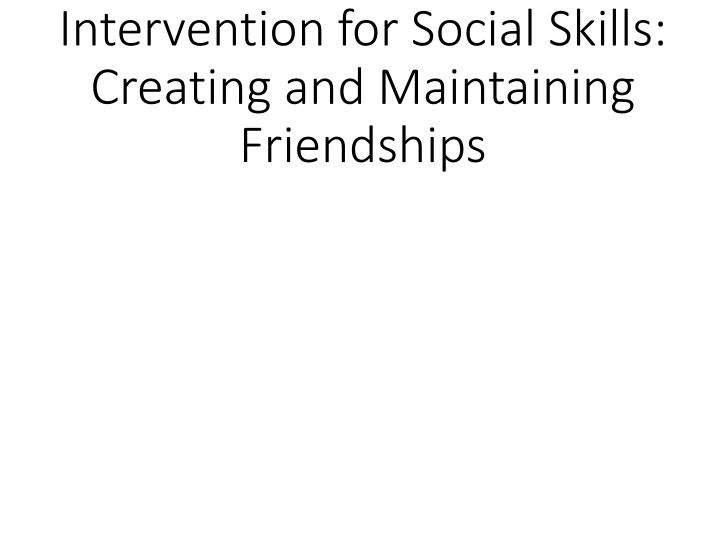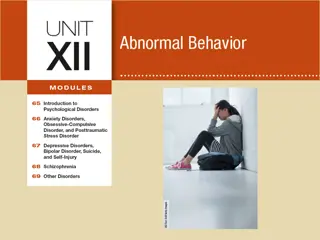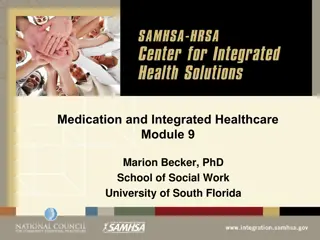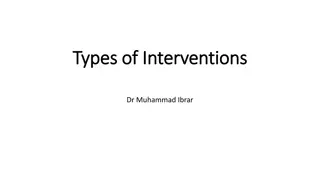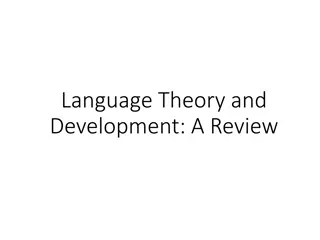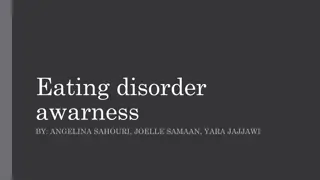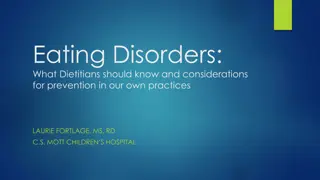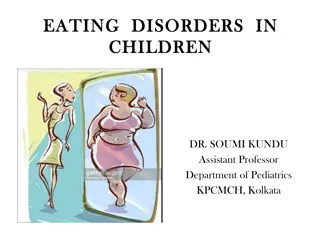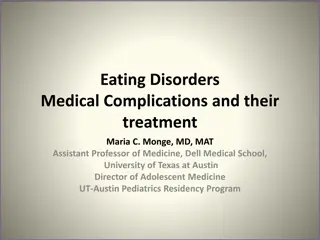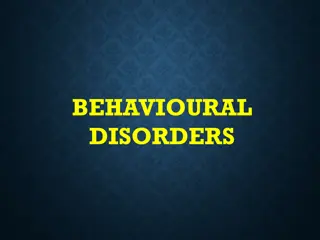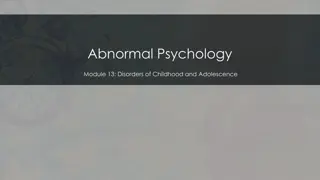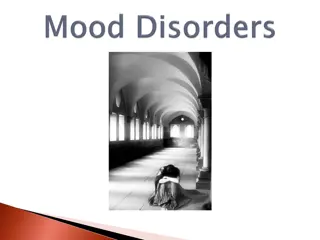Social Skills Intervention for Children with Language Disorders
Understanding the importance of social skills intervention for children with language disorders is crucial in facilitating their ability to make and maintain friendships. Research highlights the challenges faced by these children such as difficulty accessing conversations, emotional problems, and increased risk factors. By implementing positive skills for making and keeping friends, tailored assessments, and targeted interventions, the well-being and resilience of these children can be enhanced.
Download Presentation

Please find below an Image/Link to download the presentation.
The content on the website is provided AS IS for your information and personal use only. It may not be sold, licensed, or shared on other websites without obtaining consent from the author.If you encounter any issues during the download, it is possible that the publisher has removed the file from their server.
You are allowed to download the files provided on this website for personal or commercial use, subject to the condition that they are used lawfully. All files are the property of their respective owners.
The content on the website is provided AS IS for your information and personal use only. It may not be sold, licensed, or shared on other websites without obtaining consent from the author.
E N D
Presentation Transcript
Intervention for Social Skills: Creating and Maintaining Friendships
PowerPoint Outline** I. Need for Social Skills Intervention II. Assessment III. Positive Skills for Making Friends IV. Positive Skills for Keeping Friends
We know that:** Children with SLI have difficulty gaining access to conversations Thus barge in and interrupt, or are isolated and withdrawn
St. Clair, M.C., Forrest, C.L., Yew, S.G.K., & Gibson, J. Early risk factors and emotional difficulties in children at risk of developmental language disorder: A population cohort study. Journal of Speech, Language, and Hearing Research, 15;62(8), 2750-2771.
St. Clair et al.:** 884 children with DLD were evaluated for this study (ages 3-11 years) They had increased levels of emotional problems compared to the general population Increased emotional difficulties found in children with DLD are likely a function of early language difficulties influencing other domains of development
Students who can benefit:** SLI ASD Learning disability Intellectual disability
Lyons, R., & Roulstone, S. Well-being and resilience in children with speech and language disorders. Journal of Speech, Language, and Hearing Research.** Examined children with SLI or speech sound disorder and analyzed data to find themes relating to potential risk factors to well-being and protective strategies.
Phillips** Show social skill videos Videos are very helpful because they depersonalize emotions and don t make students feel judged
Kathryn Phillips** Show video clips of Donkey annoying Shrek While I show this 1 minute video, write down several behaviors Donkey is displaying that annoy Shrek and Fiona. Why are they annoying?
Big Bang Theory for older students** Sheldon and Amy first date TBBT Penny drives Sheldon and Amy to Date !! List the things Amy and Sheldon do that are awkward
Singer, I., Klatte, I.S., Welbie, M.,** Conssen, I.C., & Gerrits, E. (2020). A multidisciplinary Delphi consensus study of communicative participation in young children with language disorders. Journal of Speech, Language, and Hearing Research, 63, 1793- 1806.
This slide not on exam** The Delphi technique (also referred to as Delphi procedure or process), is a method of congregating expert opinion through a series of iterative questionnaires, with a goal of coming to a group consensus
not on exam: Iterative approach: continuing improvement
Singer et al. 2020:** This was a Dutch study They created an online Delphi study with 47 panel members---parents, young adults with language impairment, teachers, SLPs, linguists, researchers The panel said that when treating children with LI, improving actual participation in real life communication activities was more important than language structure (e.g., syntax and morphology)
Singer et al. 2020the most important skills to target in tx the child:
Levey 2024other important skills for treatment to ensure successful peer acceptance:
II. Assessment** Test of Pragmatic Language:2 (TOPL:2) The CELF:5 has a checklist You can have parents and teachers fill out surveys** Informal observations**
This was on Pinterestkids hold up the popsicle stick for expected and unexpected behaviors
A. Being Interested in Others** Objective: The student will identify several techniques for showing interest in others Rationale: The best way to make friends is to show interest in other people. People love to have others notice them and want to know more about them.
Thinking Questions** Why is it important to have friends? How could you show someone you d like to become friends? Why is this better than just going up to someone and talking about yourself?
From the Big Bang Theory Please pass the butter You may have seen this in CSAD 112
Activity: See your copy book page Being interested in others Be the SLP and the child Then share with us
B. Being Interesting** Objective: The student will list 10 things about him- or herself that would be considered unique or interesting Rationale: People are attracted to interesting people. Help your students think about things about themselves that are unique and appealing.
Thinking Questions:** How are you different than anyone else in this room? What are some differences you re proud of? What are some ways that you are like others? What could you talk about together?
C. Spending Time with Others** Objective: The student will identify several ways that friends could spend time together Rationale: People who spend time engaging in the same activity automatically have a common interest. In this lesson, students are asked to start thinking about places or situations involving spending time with others.
Thinking Questions** Where are some places that you and others might go for fun? To make new friends, how could you spend time and get to know them better?
Activity** Use the worksheet in your Simply Brilliant book called Spending Time with Others Have the child read the conversations and try to decide where the conversations are taking place and how the characters are spending time together.
D. Inviting Others into Your Group** Objective: The student will list examples of polite ways to invite someone else to join a group. Rationale: Sometimes groups are formed by choice, other times at random. New students might feel shy and hesitant to join a new group. Inviting others in is the socially mature thing to do. It helps us grow!
Thinking Questions** What if you wanted to invite someone to sit with your group at lunch, but others in your group said no? What good things could happen if you let someone new join your group?
Together, do the worksheet in your book: What are some good ways of inviting others into your group?
E. Helping Out** Objective: The student will identify specific ways to help someone who is in a problem situation. Rationale: Helping others out of an embarrassing or tough situation is one way to make a friend. What are some ways you can help someone else out?
Thinking Questions** What would you do if you saw someone who needed help? What are some problems you could help out with? How would the person feel?
Activity** Using your Simply Brilliant book sheet Helping Out, have the student draw a picture of how they might help someone in each situation. What would the student say to the person they were helping? Then share with us
F. Listening** Objective: The student will identify comments made by a character who appears to be listening to another character. Rationale: Many people like to talk; few like to listen. But because people like being listened to, listening is a good way to make friends. A way to show that you are listening is to make a comment or ask a question about what the other person is talking about.
Thinking Questions** How could you show that you are listening to someone and are interested in them? If you aren t interested in what someone is saying, is it OK to pretend that you are?
Activity** Do the Listening worksheet from your Simply Brilliant book. Ask the child: How did the listeners show they were listening? How were their comments polite and appropriate? Which one asked for more information? How did each make the talker feel?
G. What is Encouragement?** Objective: The student will identify a character giving an encouraging statement to another. Rationale: Many students don t know what it is to encourage others. Instead of giving others a little boost to make them feel good, it s me first.
Thinking Questions** When have you felt discouraged? What does encouragement mean? If you encourage someone, how do they feel?
Activity** In your copy book, complete the activity What is Encouragement? Then share with us.
H. Saying Nice Things** Objective: The student will state an example of a polite command that could be made in given situations. Rationale: If you make a nice comment to someone, that lets them know you d like to be friends. People like to hear nice things about themselves. Sometimes a compliment is a perfect way to start a friendship!
Thinking Questions** What is a compliment? Are there situations where you can say something nice to someone else? Why is that a good way to make friends?
Activity** With a partner, work on the Saying Nice Things page from the Simply Brilliant book.
A. Let Others Choose Sometimes** Objective: The student will identify reasons for letting someone else choose what to do. Rationale: Some students like to always be in control and in charge. This lesson helps students think about what it s like to be around someone who s bossy.
Thinking Questions** How would you feel if you were with someone who always wanted to make the decisions? Why is it important to let others have their way sometimes?
